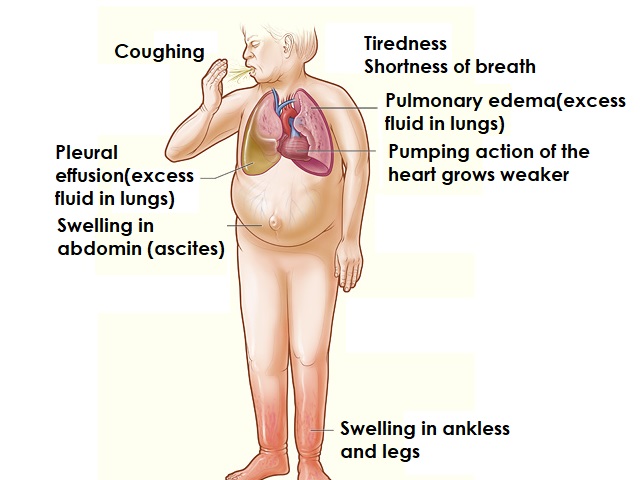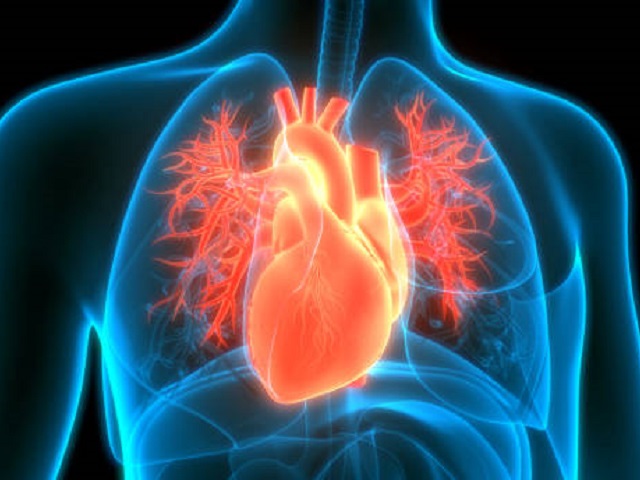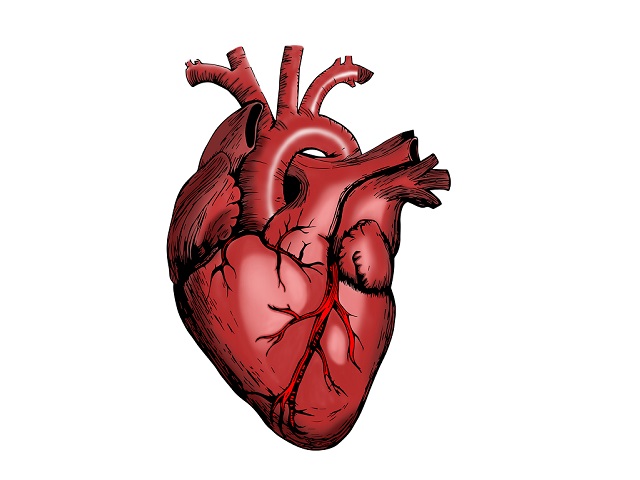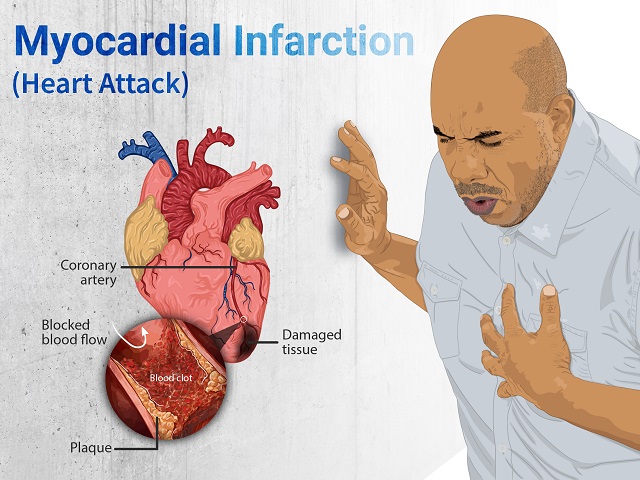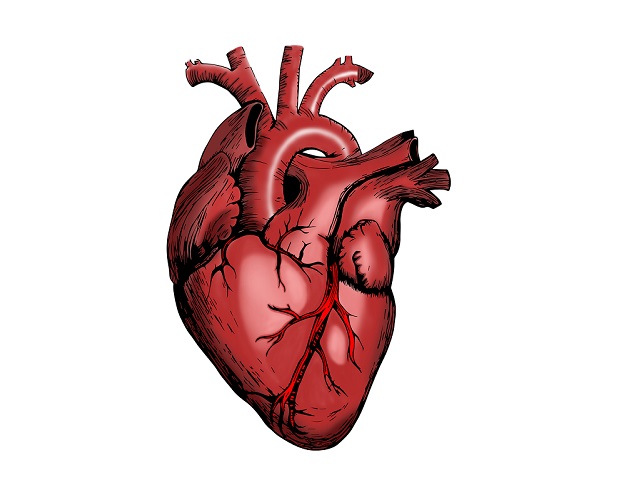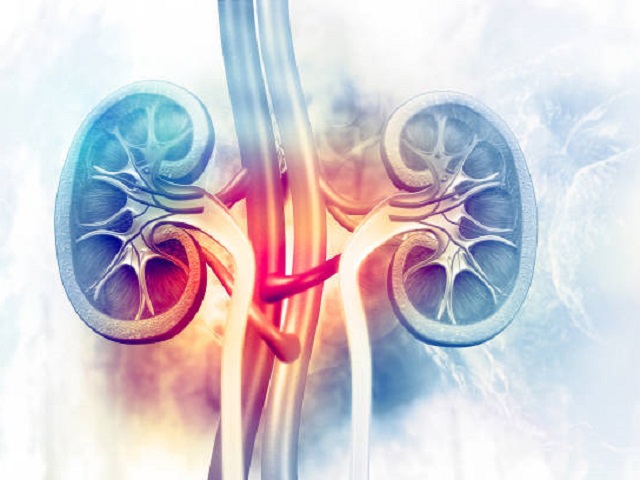9 Signs You May Have Congestive Heart Failure -- Symptoms, Causes, Effects, Treatment and Prevention
Congestive heart failure (CHF) is a chronic condition in which the heart is unable to pump blood efficiently, leading to a buildup of fluid and congestion in various parts of the body. It can result from various underlying conditions that weaken or damage the heart muscle. Here is an explanation of congestive heart failure, along with its symptoms, diagnosis, causes, effects, treatment, and prevention:
Symptoms of Congestive Heart Failure:
The symptoms of congestive heart failure can vary depending on the severity and progression of the condition. Common symptoms include:
- Shortness of breath, especially during exertion or when lying flat
- Fatigue and weakness
- Swelling in the legs, ankles, feet (edema), or abdomen (ascites)
- Rapid or irregular heartbeat
- Persistent cough or wheezing
- Increased need to urinate at night
- Weight gain due to fluid retention
- Decreased appetite and nausea
- Difficulty concentrating or decreased mental alertness
Diagnosis of Congestive Heart Failure:
Diagnosing congestive heart failure typically involves the following assessments:
- Medical history and physical examination: Evaluation of symptoms, medical history, and risk factors.
- Echocardiogram: An ultrasound of the heart to assess its structure, function, and pumping ability.
- Blood tests: Measurement of specific markers to evaluate heart function, assess organ damage, and identify underlying causes.
- Electrocardiogram (ECG or EKG): A recording of the heart's electrical activity to detect irregularities or abnormalities.
- Chest X-ray: Imaging to assess the size and condition of the heart and identify signs of fluid buildup in the lungs.
- Cardiac catheterization: A procedure to assess blood flow, measure pressures, and evaluate coronary arteries.
Causes of Congestive Heart Failure:
Congestive heart failure can have various causes, including:
- Coronary artery disease: Narrowing or blockage of the coronary arteries that supply blood to the heart muscle.
- High blood pressure (hypertension): Chronic elevation of blood pressure, which strains the heart over time.
- Previous heart attack (myocardial infarction): Damage to the heart muscle due to a blocked coronary artery.
- Cardiomyopathy: Weakening or stiffening of the heart muscle, often due to genetic factors, infections, toxins, or other diseases.
- Heart valve disorders: Malfunctioning or leaking heart valves that disrupt blood flow.
- Congenital heart defects: Structural abnormalities present at birth that affect heart function.
- Arrhythmias: Abnormal heart rhythms that can lead to CHF if left untreated.
Effects of Congestive Heart Failure:
Congestive heart failure can have several effects on overall health and well-being, including:
- Fluid accumulation: Fluid buildup in the lungs (pulmonary edema) and other body tissues due to impaired circulation.
- Reduced exercise tolerance: Difficulty performing physical activities due to reduced cardiac output.
- Organ dysfunction: Impaired blood flow to vital organs, leading to organ damage or failure.
- Fatigue and decreased quality of life: Chronic fatigue, limitations in daily activities, and decreased overall well-being.
Treatment of Congestive Heart Failure:
The treatment of congestive heart failure aims to improve symptoms, slow disease progression, and manage underlying causes. Treatment options may include:
- Lifestyle modifications: Following a heart-healthy diet, maintaining a healthy weight, exercising regularly, limiting salt intake, and avoiding alcohol and tobacco.
- Medications: Prescribed medications may include diuretics, ACE inhibitors, beta-blockers, angiotensin receptor blockers (ARBs), aldosterone antagonists, or digoxin to manage symptoms, improve heart function, and control blood pressure.
- Cardiac devices: Implantation of devices such as pacemakers or defibrillators may be necessary to regulate heart rhythm or support heart function.
- Surgical interventions: In some cases, surgical procedures such as coronary artery bypass grafting (CABG) or heart valve repair/replacement may be necessary.
- Heart transplantation: For severe cases of heart failure, heart transplantation may be considered.
Prevention of Congestive Heart Failure:
While some risk factors for congestive heart failure, such as genetic predisposition or congenital heart defects, cannot be changed, certain measures can help reduce the risk:
- Manage underlying conditions: Control high blood pressure, diabetes, and other conditions that can contribute to heart failure.
- Adopt a heart-healthy lifestyle: Follow a balanced diet, maintain a healthy weight, exercise regularly, and avoid smoking or excessive alcohol consumption.
- Take medications as prescribed: Follow medication regimens and inform healthcare professionals of any new symptoms or side effects.
It is important to consult with healthcare professionals for an accurate diagnosis, personalized treatment plan, and advice specific to individual circumstances.
References:
American Heart Association. (2021). Heart Failure. Retrieved from https://www.heart.org/en/health-topics/heart-failure
Mayo Clinic. (2021). Heart Failure. Retrieved from https://www.mayoclinic.org/diseases-conditions/heart-failure/symptoms-causes/syc-20373142
National Heart, Lung, and Blood Institute. (2021). What Is Heart Failure? Retrieved from https://www.nhlbi.nih.gov/health-topics/heart-failure





